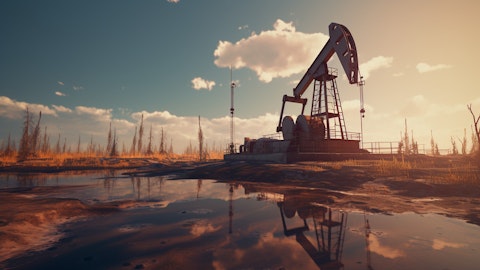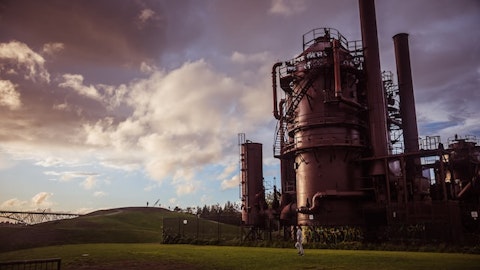Riley Exploration Permian, Inc. (AMEX:REPX) Q1 2024 Earnings Call Transcript May 9, 2024
Riley Exploration Permian, Inc. isn’t one of the 30 most popular stocks among hedge funds at the end of the third quarter (see the details here).
Operator: Good day, everyone, and welcome to the Riley Exploration Permian, Inc.’s First Quarter 2024 Earnings Conference Call. At this time, I would like to hand the call over to Mr. Philip Riley. Please go ahead, sir.
Philip Riley: Good morning. Welcome to our conference call covering the first quarter 2024 results. I’m Philip Riley, CFO. Joining me today is Bobby Riley, Chairman and CEO. Yesterday, we published a variety of materials, which can be found on our website under the Investors section. These materials in today’s conference call contains certain projections and other forward-looking statements within the meaning of the federal securities laws. These statements are subject to risks and uncertainties that may cause actual results to differ materially from those expressed or implied in these statements. We’ll also reference certain non-GAAP measures. The reconciliations to the appropriate GAAP measures can be found in our supplemental disclosure on our website. I’ll now turn the call over to Bobby.

Bobby Riley: Thank you, Philip, and thank you again to everyone for joining us on today’s call. Yesterday, at the close of the market, we announced the results of our first quarter in 2024. I’m pleased to report that Q1 was another outstanding quarter for Riley Permian. And we are on track to deliver our previously disclosed 2024 operating plan, targeting year-over-year oil growth with a reduction in CapEx. Our net oil production saw a 4% increase compared to the previous quarter, reaching an average of 14.2 thousand barrels per day. Looking ahead to our Q2 guidance, we’re forecasting a range of 14.4 to 14.8 thousand barrels per day, and we expect the majority of our incremental growth to occur in this period and stabilize for the remaining quarters as we work towards achieving our year-over-year targets.
From an operational standpoint, we drilled seven net wells, which represents approximately one-third of our projected total for the year. We released the rig in March and plan to resume drilling operations in June. Our team has achieved significant advancements in drilling efficiency by adopting cutting-edge technologies and streamlined processes. These improvements have allowed us to rely on a single rig for a portion of the year while still delivering double-digit volume growth. We completed four wells and brought six wells online during the period, benefiting from two drilled but uncompleted wells, or DUCs, from late 2023. On Tuesday of this week, we closed our previously announced bolt-on acquisition in Eddy County, New Mexico. This will expand our existing operating footprint in New Mexico by adding 13,900 contiguous net acres.
The acreage is largely underdeveloped but is 99% held by production through legacy vertical wells. This acquisition enhances the optionality of our total development inventory by providing high-quality horizontal drilling locations, primarily in the Yeso trend, including the Blinebry, Glorieta and Paddock formations. Furthermore, the acquisition includes valuable infrastructure such as saltwater disposal wells which will optimize operations across our existing New Mexico footprint. We remain focused on creating long-term value for our shareholders and delivering predictable and sustainable growth for years to come. To achieve this, our capital strategy prioritizes discipline to allocate resources to support our growth objectives, while also delivering on our commitment to strengthen the balance sheet and return capital to shareholders in the form of dividends.
See also 10 Best May Dividend Stocks To Buy and 20 Most Urbanised Countries in Asia.
Q&A Session
Follow Riley Exploration Permian Inc. (AMEX:REPX)
Follow Riley Exploration Permian Inc. (AMEX:REPX)
Receive real-time insider trading and news alerts
Looking ahead, we remain excited about the opportunities in front of us, and we are well positioned to execute our 2024 plan and beyond. We will continue to focus on operational excellence, cost control and capital efficiency to drive long-term value creation for our shareholders. With that, I’ll now turn the call over to Philip to provide more details on our financial results.
Philip Riley: Thank you, Bobby. First quarter operating cash flow before working capital increased by 7% quarter-over-quarter despite 2% lower oil prices. The largest driver of quarter-over-quarter improvement was our settled hedges as lower-priced legacy swaps rolled off in December, and despite some generally strong prices during the quarter. In production, volume increases and cost reductions contributed to a combined $5.5 million of cash flow improvement. Oil price ended the quarter about $11 higher than at year-end, which in turn led us to book the non-cash derivatives loss and which drives the lower net income this quarter. As of today, that dynamic has already partially reversed with lower oil prices. The non-cash derivatives values flip flop frequently by quarter and correspond infrequently with ultimate settled amounts is one of the reasons we focus less on net income.
Reinvestment rate of operating cash flow into upstream CapEx was 45% on an accrual basis and 60% on a cash CapEx basis. The larger ratio of cash-to-accrual CapEx this quarter was driven by some larger prepayments, including on infrastructure for work that had not yet occurred and that will drive success for the full year development plan. We converted 40% of operating cash flow to free cash flow in the first quarter, representing continued improvement with this metric from prior years. Free cash flow declined quarter-over-quarter, but there is no concern there. First, we use cash CapEx for our free cash flow calculation while many companies use accrual CapEx. If we had used accrual CapEx, then free cash flow would have increased by 11% quarter-over-quarter.
In the fourth quarter of ’23, we had a especially light cash CapEx, opposite of this quarter’s dynamic. Second, we regularly encourage observers to focus on a four-quarter measure of free cash flow over a single quarter. We’ll now turn it back to the operator for questions. Thank you.
Operator: Thank you, Philip. We will now take a question from Neal Dingmann from Truist Capital.
Neal Dingmann: Good morning, guys. Nice quarter. Phil or to you Bobby, if you could talk maybe a little bit more about the acquisition, but pretty positive? Maybe in terms of what it added in terms of production? Maybe how we should think about incremental volumes throughout the year on this? And impact on guidance? And maybe even on the oil cut throughout the year? Just wondering how this might impact things.
Philip Riley: Yes, sure. I can start with that, Neal, this is Philip. The acquisition, it’s producing about 400 barrels a day. That closed a couple of days ago, so you really only get the benefit for about two-thirds of the year. So when you divide that by a full year, that adds maybe 260 barrels a day average over the year. So it’s some of what we’re dealing with is the dynamic of averages over the year. So the guidance range we gave, 14.4 to 14.8, if you use the midpoint there, and if we held it flat, as Bobby was describing, that gets you to 14.5 for the year, right kind of smack in the middle of the previously disclosed guidance range. To reach that high end, we’d have to get to 15.3 on average for the remaining — for all three quarters here.
So we think it’s pretty representative of a full year. The existing production is mostly kind of a mix of some few small non-op horizontal contributors there and then some smaller vertical. We do like it for that underdeveloped horizontal inventory, which we don’t plan to drill this year. So that’s the, I guess, the color on how it affects our production ranges. In general, we’re excited about it. We like the idea of maintaining roughly a decade of inventory, and we think that this gets us there. It’s also got some valuable infrastructure that we need both for our operations. And then frankly, we can even charge non-op partners neighbors in such the fees as they use our saltwater disposal wells and such. Does that answer the question?
Neal Dingmann: Yes, it did, certainly does. It’s good to hear. And then just a follow-up, could you maybe, you or Bobby, just talk a bit on oilfield services? It seems that bulk, maybe just talk about cost and availability. It seems like you’re able to let the rig go, bring the rig back when you choose. It seems like you have, number one, just a lot of flexibility on the availability side. So I was wondering just — is that the case? And then secondly, just on the OFS cost side, what you all see in it?
Bobby Riley: Yes, Neal, this is Bobby. I’ll take that. So yes, we have a great relationship with the drilling contractor that’s in the area that we’re able to bring in and drill a batch of wells. And then releasing to some of our offset partners there to drill, but keep them in the same area. As we go to more pad drilling type of applications, it has — we have lower cost on rig moves and more efficiencies on days from spud to TD, et cetera. So those costs are really falling in where we want them to be. Otherwise, on the pressure pumping side, we’re seeing a softer market so that we’re getting more competitive bids and pricing. I think we talked about that dynamic as some of these larger mergers and acquisitions have occurred. It’s freed up a lot of frac teams and services that they want to maintain their market share. They’re more aggressively pricing services for us. So we’re taking advantage of that as we can right now in that market.
Neal Dingmann: Yes, I love the flexibility. Thanks guys.
Operator: [Operator Instructions] Our next question comes from the line of John White from ROTH Capital. Please go ahead.
John White: Good morning. And congratulations on closing your New Mexico acquisition.
Philip Riley: Thank you, John.
John White: I wanted to ask about the RPC Power project. In the press release, you said you put in another $5.6 million, in effect, completes the funding for the current project. So that’s the funding. How would you describe the work out in the field on the actual infrastructure?
Bobby Riley: Yes. I would say we’re kind of right on schedule where we thought we’d be. We’re installing 20 megawatts of power out there. We’ve had 10 megawatts over there for some time and we’re just now receiving the second package of generators to get us up to our total design. We’re currently getting all of that stuff tied into our private use network, which basically allows us to self-distribute power to all of our wells. So I think, operationally, that should be 100% operational probably by end of summer. And so far, I think we’re really excited about that opportunity, at least we’re producing our base load. And then looking at other opportunities that we might see coming our way with power.
John White: Thanks for that. And when it’s fully up and running, how much of your electricity or your power needs will this project satisfy?
Bobby Riley: Yes. So it’s basically almost 100% of our power demand in Yoakum County on what we call our Champions. When we first designed the infrastructure out there, we laid that network in place. And now that’s — we’re able to utilize that and we’ll be self-providing practically 100%. There might be one or two wells that’s still on an isolated meter, but the majority of it will be self-generating.
John White: That’s great. And does the similar opportunity exists on your New Mexico properties?
Bobby Riley: It does. As we’re building out and looking at our infrastructure requirements in New Mexico, going forward, we are instead of tying individual meters back into the grid. We are installing, I don’t know if it’s the term, it’s a private use network or our primary point of take from the provider out there so that eventually we can tie our own gen systems into that as well. But that’s a little bit long term. We probably won’t get there this year, but we’re still on the laying out. It has to do with establishing drilling schedules and time to water infrastructure and all of that at the same time. But it’s definitely what we do in our operation, and we will be doing that going forward.
John White: Okay. Thanks for the additional details. I appreciate it.
Operator: [Operator Instructions] Our next question comes from the line of Jeff Robertson from Water Tower Research. Please go ahead.
Jeff Robertson: Thank you. To follow up on the power venture, Bobby or Philip, can you try to quantify the economic impact of supplying your own power to the Champions acreage compared to the alternative, which might have been selling the produced natural gas just into the grid at a relatively low price?
Bobby Riley: Yes. So that’s what we’re trying to do is basically increase the margins on the hydrocarbons that we produce in the area. So as you know, as Waha goes negative, sometimes the residue gas has little or no value to us. And because we’re able to take that residue gas in time and power our gensets to offset our baseload production, our baseload operations. So from an individual well lease operating cost, it’s probably somewhat neutral. But since we’re a JV partner in the — and the power company roughly will benefit from 50% of the revenues from generating power.
Philip Riley: 35% ownership right now that we’re set to benefit from. And we think it’s kind of a high-teen type of return, Jeff, but that’s a nice stable return, right? This isn’t an oil well that’s declining, so it’s something that we’re excited about.
Jeff Robertson: Is it fair that the other part of the return just comes from having a more reliable source of power, which might lead to…
Bobby Riley: Absolutely. I mean, that was one of the primary reasons there is because we’re kind of at the end of the grid there. And we were experiencing some brownouts or frequent power disruptions that cost an extensive amount of money to bring some of those wells back on. So that’s — again, it’s one of the main reasons for doing this is more reliable power.
Jeff Robertson: In New Mexico, you talked about the saltwater disposal, the wells you acquired in the most recent acquisition and your SWD assets that serve that area. Do you need to spend much capital to either upgrade or enhance those to be able to handle Riley’s activity plus be able to maybe take third-party volumes?
Bobby Riley: I think we’re going to focus on just tying those wells in with some flow lines to loop them into our system to give us excess capacity. Primarily, we want to make sure that our disposal requirements are met with some spare capacity for emergencies and stuff like that. But as we continue to look at opportunities there, I think there would be some coming in where you could be charging some third party. But for the most part right now, we’re 100% focused on our own disposal requirements.
Jeff Robertson: Either way you get some. Well, you ultimately get some LOE benefit from — as you work through that process?
Bobby Riley: Yes, we should. I mean basically, the more wells that we have, the less amount of water each well has to take, which needs less energy it takes to push it down hole, et cetera, like that, so that gives us some savings there. And this gives us some redundancy, some fallback spare capacity. And then the ability to bring in some third-party water if we see that we got the excess capacity and moving water is important to us out there, and that’s one of our main focuses to make sure we stay on top of that.
Jeff Robertson: Thank you.
Operator: Ladies and gentlemen, that concludes today’s call. Thank you all for joining. You may now disconnect.
Follow Riley Exploration Permian Inc. (AMEX:REPX)
Follow Riley Exploration Permian Inc. (AMEX:REPX)
Receive real-time insider trading and news alerts



